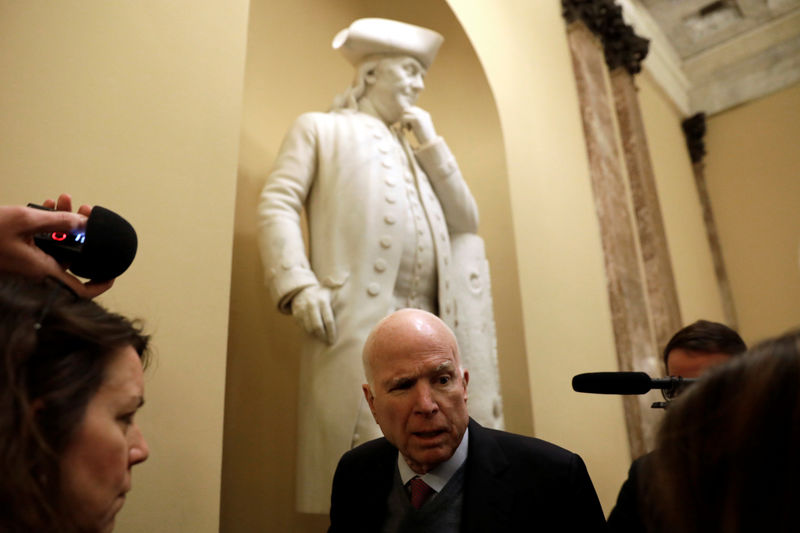By David Morgan and Susan Cornwell
WASHINGTON (Reuters) - The Republican drive to push sweeping tax legislation through the U.S. Senate picked up momentum on Thursday with the endorsement of Senator John McCain, as party leaders pursued behind-the-scenes deals to secure enough votes for passage.
McCain, who was instrumental in defeating the Republican push to overturn Obamacare earlier this year, said the bill was "far from perfect" but would boost the economy and provide tax relief for all Americans. But Republican Senator Susan Collins told reporters she was still not committed to backing it.
The Republican-controlled Senate was expected to begin a potentially chaotic "vote-a-rama" on amendments from Republicans and Democrats before moving to a final vote late on Thursday or early on Friday.
U.S. financial markets have rallied on optimism that the measure will pass, a sentiment shared by outside conservative groups that hope to see the first major overhaul of the U.S. tax code since 1986, when Republican Ronald Reagan was president. U.S. stocks extended gains on Thursday after McCain said he would back the tax legislation.
"It's the most unified effort I've seen on any issue in many years," said Tim Phillips, president of Americans for Prosperity, a group aligned with billionaire industrialists Charles and David Koch.
President Donald Trump and his Republican allies have been under mounting pressure to enact a package of tax cuts for businesses and individuals before January, giving them their first major legislative victory.
Republicans acknowledge that failure to pass a tax bill could alienate donors and jeopardize their control of the Senate and House of Representatives in next year's congressional elections, even though opinion polls show the public is divided.
Among Americans aware of the Republican tax plan, 49 percent said they were opposed, up from 41 percent in October, according to a Nov. 23-27 Reuters/Ipsos poll released on Wednesday. The latest online poll of 1,257 adults found 29 percent supporting the plan and 22 percent saying they "don't know."
Democrats say the Republican tax plan is a giveaway to corporations and the wealthy at the expense of working Americans.
The House approved its own tax bill on Nov. 16. If passed this week, the Senate legislation would need to be reconciled with the House version before a final bill could be sent to Trump.
As an initial action on Thursday, Senate Republicans were expected to take a procedural vote that would formally replace the House bill with their own legislation.
KEEPING THEM GUESSING
Senate Republican leader Mitch McConnell did not appear to have enough votes to pass the legislation as the day began, with several Republican lawmakers keeping their colleagues guessing about where they would come down in the end. Trump has publicly insulted several senators who have ultimately expressed doubts about the tax plan.
Republicans have a 52-48 majority in the 100-member Senate, giving them enough votes to approve the bill if they can hold together. With Democrats united in opposition, they can afford to lose support from no more than two of their own members. Vice President Mike Pence would be able to break a 50-50 tie.
The Senate voted along party lines to begin the debate on Wednesday and later turned away a Democratic attempt to return the legislation to the tax-writing Senate Finance Committee for reconsideration.
But some Republicans have withheld support for final passage as they press Republican leaders for changes that would prevent tax cuts from expanding the federal deficit, allow Americans a federal deduction for up to $10,000 in property taxes and give bigger tax breaks to so-called pass-through enterprises, including small businesses.
The Senate bill would cut the U.S. corporate tax rate to 20 percent from 35 percent after a one-year delay and reduce the tax burden on small businesses and individuals, while adding $1.4 trillion to a federal debt load that already surpasses $20 trillion.
Some Republicans want to lower the corporate tax rate to only 22 percent and forgo income tax cuts for the wealthiest Americans. Republican Senator Roy Blunt told reporters the 20-percent corporate rate "won't be raised much at all."
Another major sticking point in the Senate is how the bill deals with the federal deficit and the national debt. Senator Bob Corker, one of the few remaining Republican fiscal hawks, wants a tax snap-back provision in the bill that would raise taxes automatically if economic growth targets are not hit in the future to offset a higher deficit.
That trigger proposal has become a target of growing criticism among conservative Republicans and lobbyists, including interest groups aligned with the billionaire industrialists Charles and David Koch, who say the prospect of tax hikes could undermine future economic growth.

Democrats and independents have sought to persuade nonpartisan Senate officials to disqualify parts of the bill, including one to allow drilling in the Arctic National Wildlife Refuge, as impermissible under Senate rules, an aide said.